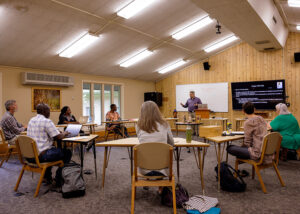“Though one may be overpowered, two can defend themselves. A cord of three strands is not quickly broken” (Ecclesiastes 4:12, NIV).
Most likely, you have heard these words during a wedding ceremony. Although they are fitting for the marriage context, I would suggest that this verse also speaks to our need for each other.
In our western society we pride ourselves by saying that we have accomplished tasks on our own. If we do realize our need for another, we prefer to offer help rather than to receive assistance.
Within the body of Christ, though, interdependence is valued and celebrated. As the writer of Ecclesiastes counsels, alone one can be overcome. Two are better than one, but three woven together like a thick rope are stronger still.
This describes Mennonite Church Canada’s transition to relational funding and the implementation of Witness Support Teams. The spirit of the team concept is interdependence and commitment to work together to build a stronger connection between international ministry and Canadian congregations.
Currently, each Witness worker is identifying volunteers from one or more congregations who will form the key roles of his/her Witness Support Team. Identifying the right volunteers is critical to form and nurture those relationships that Witness workers have already cultivated with ministry supporters.
Each Witness Support Team will:
1. Generate financial support for the Witness worker.
2. Form and nurture relationships between the worker and supporters.
3. Support and care for the worker.
4. Create opportunities for congregational engagement.
5. Nurture international-partner relationships.
Each Witness Support Team collaborates with its Witness worker and regional church engagement staff to ensure the full funding support required for each ministry. This collaborative fundraising effort enables workers to raise a minimum of 50 percent in relational funding. The remainder will be incorporated into the MC Canada budget to ensure full funding.
Each team creates and maintains relationships between the worker and supporters through prayer, advocacy and communication of opportunities for relationships and involvement with international partners. The team is a caring and supportive community that enhances the worker’s experience internationally through regular prayer and willingly participates in specific fundraising projects and events as needs arise.
The team also creates opportunities for congregations to engage with a worker and family through exchange visits, learning tours, and by inviting the worker and international partners to participate in congregational gatherings. The team also seeks to build long-term relationships with international partners, enabling the relationship to develop and flourish on behalf of the larger church.
Congregations will be inspired to participate in God’s mission across the street and around the world because of the deeper relational connections encouraged through the collaboration of Witness Support Teams, Witness workers and regional churches.
The three-strand cord referred to by the writer of Ecclesiastes represents my understanding of this interdependent relationship between workers, Witness Support Teams and regional churches, intertwined together and forming a strong community committed to a common purpose and vision.
Jason Martin is Mennonite Church Canada’s director of International Witness.
Read more From Our Leaders columns:
Welcome to Gathering 2019
Dreaming of possibilities
Deepening our walk with each other
Relational engagements outside the church
‘To be more like them’









Leave a Reply
You must be logged in to post a comment.